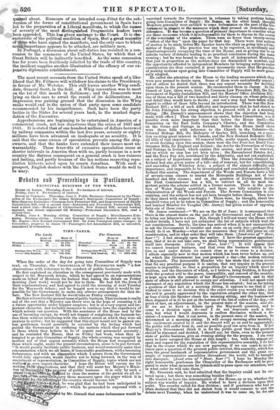The most recent accounts from the 'United States speak of
a like- lihood that Mr. Fillmore will withdraw his claims to the Presideney, in favour of Mr. Webster. This still leaves another Whig candi- date, General Scott, in the field. I Whig convention was to meet on the 1st of this month in Baltimore; and the Democrats were lying on their oars to await the result of its deliberations. An impression was gaining ground that the dissension in the Whig ranks would end in the union of that party upon some candidate recommended by his insignificance. Such have been the party tactics in the States for several years back, to the marked degra- dation of the Executive.
Apprehensions are beginning to be entertained in America of a commercial crash, not less disastrous than the crises of 1837 and 1841. It is stated that of one hundred millions of dollars borrowed by railway companies within the last five years, seventy or eighty millions have been advanced on inadequate or no security. It is said that the same excess of speculation prevails among the ship- owners, and that the banks have extended their issues most un- warrantably. These fever-fits of excessive speculation recur at shorter intervals in America than with us, partly because in a new country the distress consequent on a general crash is less ruinous and lasting, and partly because of the lax notions respecting repu- diation hitherto acted upon by cousin Jonathan. With such a prospect, English dealers with the United States would do well to be wary.


























 Previous page
Previous page